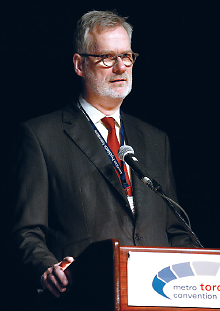More than half a century passed before the German psychiatric community openly acknowledged the role of its predecessors in the deaths of thousands of people with mental illness during the Nazi era, said Frank Schneider, M.D., Ph.D., at APA’s 2015 annual meeting in Toronto.
“Psychiatrists and psychiatry were not victims; they were actors,” said Schneider, a professor of psychiatry, psychotherapy, and psychosomatics at Aachen University in Germany. “This was a dark chapter in German psychiatry, but it is still important to learn from it.”
Nazi-era psychiatrists took part in identifying Germans with severe mental, neurological, and physical illnesses under a 1933 law for the “Prevention of Hereditarily Diseased Offspring,” said Schneider. The individual’s “hereditary value” became the prime criterion for who would live or die.
Nearly 360,000 people—including those with schizophrenia, bipolar disorder, epilepsy, Huntington’s disease, blindness, deafness, severe physical deformity, and severe alcoholism—were forcibly sterilized in operations that led to more than 6,000 deaths. Ultimately, 200,000 mentally disabled people were murdered by the Nazi regime in a program largely staffed by psychiatrists, called “Aktion T4.” Ironically, the few psychiatrists who refused to take part in the program usually escaped without punishment, said Schneider.
Aktion T4 served as preparation for the mass murder that was to follow during World War II. The killing centers used gas chambers and crematoria, and Irmfried Eberl, M.D., the medical director of the Brandenburg and Bernburg killing centers, later became the first commandant of the Treblinka death camp.
The stigma attached to mental illness and other hereditary defects lingered for decades after the war, leading to suppression of the history of sterilization and murder during the Nazi era, said Schneider.
Many of the physicians who participated returned to civilian life without facing any consequences. Two even became president of the post-war German Association for Psychiatry, Psychotherapy, and Psychosomatics (DGPPN).
One German psychiatrist, Gerhard Schmidt, M.D., wrote a book about the sterilization and killing programs in 1945 but could not find a publisher for another 20 years.
“No one wanted to hear the story,” said Schneider. “In the 1960s and 1970s, psychiatrists saw themselves as victims, and only beginning in the 1980s was there an attempt to examine the past.”
That attempt was advanced in 1990 when Johannes Meyer-Lindenberg, M.D., then the president of the DGPPN, addressed APA’s annual meeting: “Psychiatrists had failed to respond or were indifferent to patients during the Third Reich,” Meyer-Lindenberg said. “The majority of psychiatrists did nothing to protect their patients or to stop the action.”
The profession’s self-scrutiny of its involvement in this dark period has since grown, Schneider explained. In 2009, the DGPPN acknowledged a “special responsibility to protect the dignity and rights of people suffering from mental illness.” The organization also commissioned an international group of researchers to study the Nazi period.
Out of this study came an exhibition called “Registered, Persecuted, Annihilated: The Sick and the Disabled Under National Socialism” that was displayed in the German parliament and is now traveling to numerous cities around the country.
In 2010, Schneider, then president of the DGPPN, formally asked the victims of the Nazi era and their families for “forgiveness for the pain and injustice [they] suffered in the name of German psychiatry and at the hands of German psychiatrists under National Socialism, and for the silence, trivialization, and denial that for far too long characterized psychiatry in post-war Germany.” ■
An English translation of Frank Schneider’s 2010 speech to the DGPPN acknowledging the failures of German psychiatry during and after the Nazi era can be accessed
here. More information on psychiatry under National Socialism is available
here. A 1946 statement by Gerhard Schmidt, M.D., on the Aktion T4 killing program is posted
here.

